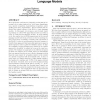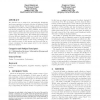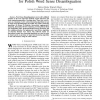204
Voted
CIKM
2011
Springer
14 years 21 days ago
2011
Springer
Word prediction performed by language models has an important role in many tasks as e.g. word sense disambiguation, speech recognition, hand-writing recognition, query spelling an...
150
Voted
AAAI
2011
14 years 22 days ago
2011
Effective access to knowledge within large declarative memory stores is one challenge in the development and understanding of long-living, generally intelligent agents. We focus o...
139
click to vote
JCDL
2011
ACM
14 years 3 months ago
2011
ACM
We describe here a method for automatically identifying word sense variation in a dated collection of historical books in a large digital library. By leveraging a small set of kno...
268
Voted
FLAIRS
2011
2011
Impact of Word Sense Disambiguation on Ordering Dictionary Definitions in Vocabulary Learning Tutors
14 years 4 months ago
Past research has shown that dictionaries and glosses can be beneficial in computer assisted language learning, particularly in vocabulary learning. We propose that L2 vocabulary ...
127
Voted
ACL
2011
14 years 4 months ago
2011
Disambiguating concepts and entities in a context sensitive way is a fundamental problem in natural language processing. The comprehensiveness of Wikipedia has made the online enc...
109
Voted
COLING
2010
14 years 7 months ago
2010
Choosing the right parameters for a word sense disambiguation task is critical to the success of the experiments. We explore this idea for prepositions, an often overlooked word c...
131
Voted
COLING
2010
14 years 7 months ago
2010
Semantic role labeling (SRL) and word sense disambiguation (WSD) are two fundamental tasks in natural language processing to find a sentence-level semantic representation. To date...
130
click to vote
IMCSIT
2010
14 years 10 months ago
2010
Word Sense Disambiguation in text is still a difficult problem as the best supervised methods require laborious and costly manual preparation of training data. Thus, this work focu...
136
click to vote
ACL
2010
14 years 10 months ago
2010
In spite of decades of research on word sense disambiguation (WSD), all-words general purpose WSD has remained a distant goal. Many supervised WSD systems have been built, but the...
121
Voted
EMNLP
2009
14 years 10 months ago
2009
This paper investigates a new task, subjectivity word sense disambiguation (SWSD), which is to automatically determine which word instances in a corpus are being used with subject...



